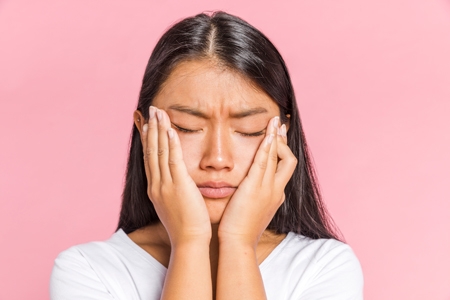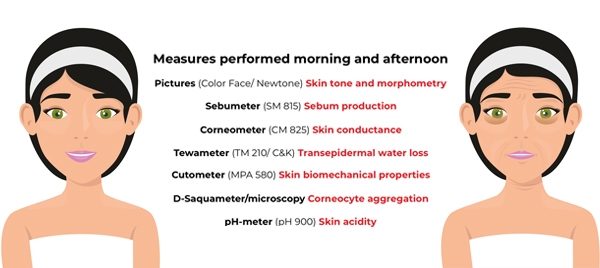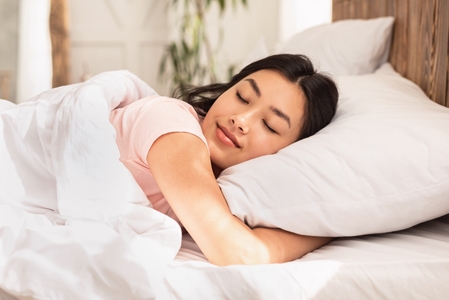Promotional Features
A good night’s sleep can impact skin hydration and elasticity
Having a poor night of sleep doesn’t do your appearance any favors. In 2013, a research study1 concluded that a poor night's sleep could lead to:
- Hanging eyelids
- Swollen eyes
- Darker undereye circles
- Paler skin
- More wrinkles and fine lines
- More droopy corners of the mouth
“You look sleepy…”
A recent study2 observed that some skin features are highly associated with sleep restriction (SR), including lower hydration, increased trans-epidermal water loss and decreased elasticity and viscosity of the skin.
7 to 9 hours is recommended for young adults and adults, and 7-8 hours of sleep is recommended for older adults.3
Twenty-four healthy (and well-rested) women aged 30–55 volunteered for this trial where the following parameters were accessed at the same time of day, before and after the limited sleep: sebumetry (Sebumeter SM 815), hydration (Corneometer CM 825), trans-epidermal water loss (Tewameter TM 210), biomechanical properties (Cutometer MPA 580), pH (PH-meter 900), desquamation quantification (D-Squameter and microscopy), and image analysis (ColorFace - Newtone Technologies). The study also analyzed skin samples (swabs) for malondialdehyde quantification (MDA).
Fig. 1. Experimental design
It was observed that some skin parameters are significantly associated with SR in both the morning and afternoon measurements, including lower hydration (p < 0.001), increased trans-epidermal water loss (PIE) (p < 0.001), and decreased extensibility (Uf; p = 0.015) and viscosity (Uv; p < 0.001) of the skin. The average pH increased from 4.8 (±0.2) to 4.9 ± 0.4; p < 0.001. Face photography, brightness and saturation also significantly decreased with SR in the mornings and afternoons (p < 0.001 for all tests). Finally, we observed a significant decrease in isolated corneocytes after desquamation associated with SR (p < 0.001 for all tests). SR was also associated with significantly increased MDA levels (p < 0.001 for all tests).
The conclusion reported from the study was that sleep deprivation that occurred over two nights significantly altered the skin and facial appearances in all the subjects of typically well-rested women.
Another trial4, showed that people were less inclined to socialize with individuals who had gotten insufficient sleep. When sleep-restricted, participants were perceived as less attractive, less healthy and more sleepy.
In 20155, the journalist of Daily Mail (UK), Sarah Chalmers, decided to take part in an SR study organized by the London-based Sleep School to uncover the impact modern sleeping habits have on our minds and bodies.
On the first day, she slept for four hours — half the recommended daily requirement. Then, after a three-day recovery period, she was restricted to six hours for five consecutive nights — akin to a working week.
“I look much older than my 46 years”, Sarah said. “My eyes have dark rings underneath and my pores are so enlarged I can see them from a distance. To top it all off, a couple of spots are beginning to develop on my chin. I had no idea that cutting back on sleep by just an hour or two a night could have such a devastating effect on everything from my concentration, memory and patience to skin tone,” she attested.
When you sleep, the circulation rises, the skin produces collagen and rebuilds the tissues, brain and muscles, as well as recovers from solar radiation and facial expressions.
Get a full night's sleep
DailyZz™ is a natural, proprietary botanical blend that promotes healthy sleep and better next-day functioning. DailyZz™ is a combination of water-extracted spearmint and green tea that is rich in naturally occurring polyphenols and has been clinically studied with statistically significant health benefits.
A 2019 survey of more than 11,000 adults in the U.S. and 11 other countries found that 62% don’t sleep well and 80% want to improve the quality of their sleep.
DailyZz™ is a clinically studied ingredient for natural sleep support:
- 100% natural, safe and non-habit forming
- Numerous product formats and ingredient combination possibilities
- 2X BETTER SLEEP QUALITY
- 5X IMPROVED CONCENTRATION
- 20ms FASTER REACTION TIME (200% faster in a concentration task)
- 2.5X BETTER JUDGMENT (in a risk-taking scenario)
- 60% IMPROVED VISUAL RECALL & PROCESSING
US Self-Affirmed GRAS, No Artificial Colors or Preservatives, Water Extracted, Plant-Based, World Friendly, Gluten Free, Vegetarian, Sustainably Grown Spearmint, Non-GMO Project Verified.
For more information, visit: DailyZz.com
-----
References:
1) Sundelin, T., Lekander, M., Kecklund, G., Van Someren, E.J.W., Olsson, A., & Axelsson. J. Cues of fatigue: Effects of sleep deprivation on facial appearance, Sleep, Volume 36, Issue 9, 1 September 2013, Pages 1355–1360, https://doi.org/10.5665/sleep.2964
2) Léger, D., Gauriau, C., Etzi, C., Ralambondrainy, S., Heusèle, C., Schnebert, S., Dubois, A., Gomez-Merino, D., & Dumas, M. “You look sleepy…” The impact of sleep restriction on skin parameters and facial appearance of 24 women. Sleep medicine, 89, 97-103. https://doi.org/10.1016/j.sleep.2021.11.011
3) Hirshkowitz, M., Whiton, K., Albert, S. M., Alessi, C., Bruni, O., DonCarlos, L., Hazen, N., Herman, J., Adams Hillard, P. J., Katz, E. S., Kheirandish-Gozal, L., Neubauer, D. N., O'Donnell, A. E., Ohayon, M., Peever, J., Rawding, R., Sachdeva, R. C., Setters, B., Vitiello, M. V., & Ware, J. C. National Sleep Foundation's updated sleep duration recommendations: Final report. Sleep health, 1(4), 233-243. PMID: 29073398. https://doi.org/10.1016/j.sleh.2015.10.004
4) Sundelin, T., Lekander, M., Sorjonen, K., & Axelsson, J., Negative effects of restricted sleep on facial appearance and social appeal. The Royal Society Publishing, 17 May 2017. https://doi.org/10.1098/rsos.160918
5) Chalmers, S., What six hours sleep a night does to your face: Unique experiment reveals how having two hours less than the recommended eight can ravage your skin, Daily Mail, 2015. https://www.dailymail.co.uk/femail/article-3085446/As-study-shows-women-dont-sleep-unique-experiment-reveals-six-hours-sleep-night-does-looks.html






